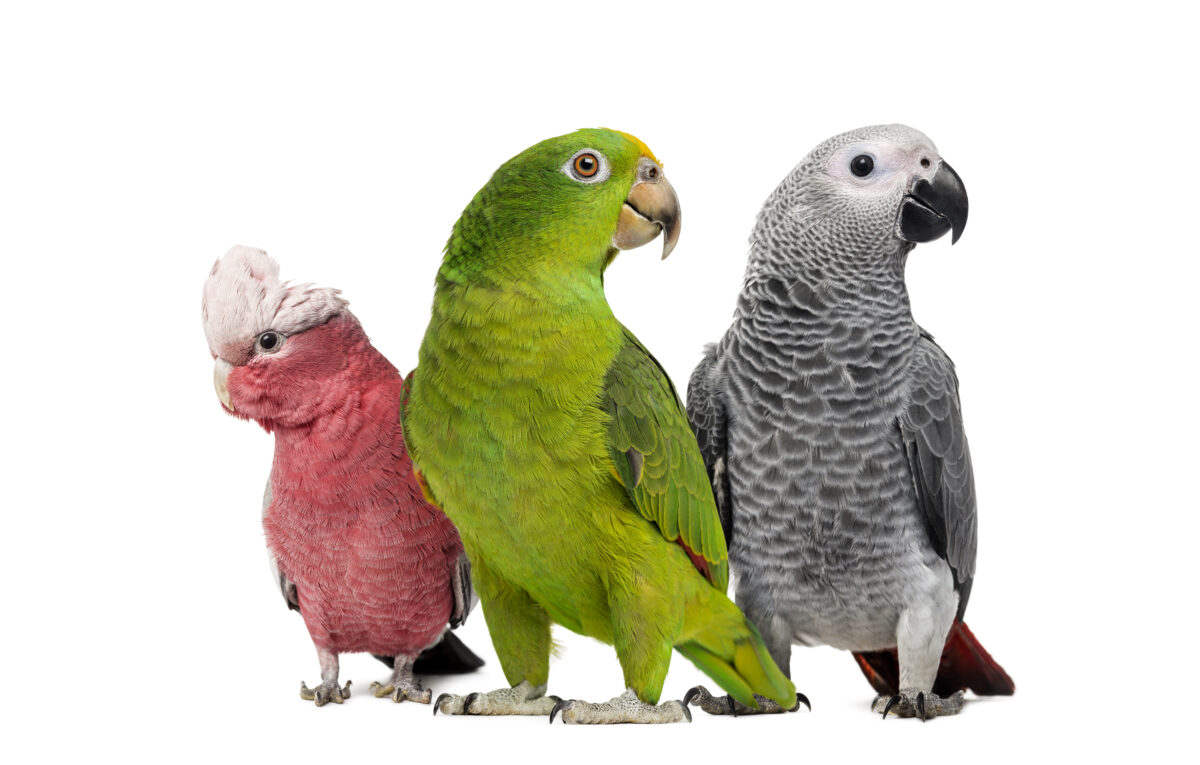It’s no surprise if you’re considering a parrot as a pet. Parrots might seem like the ultimate companion—who wouldn’t want an animal who can “talk”? Plus, they’re colorful and can hark back to childhood daydreams of being a swashbuckling pirate with a sassy bird perched on one shoulder.
However, the reality is that parrots aren’t the right fit for everyone. Before bringing home any pet, it’s important to learn about the animal and their needs, and parrots are no exception, says Laurie Hess, DVM, DABVP (Avian), owner of Veterinary Center for Birds & Exotics in Bedford Hills, New York, and author of Unlikely Companions: The Adventures of an Exotic Animal Doctor.
Factors to Consider
“When considering a parrot as a pet, prospective parrot parents should learn about the degree of noise particular parrot breeds naturally make, as well as how long various parrot breeds live,” she said. “Some parrots can live for decades, so parents may have to include these pet birds in their wills.”
Her point is well taken; African grey parrots, for instance, can live 40 to 60 years or more in captivity.
Dr. Hess advises talking to your veterinarian about the various medical and behavioral issues certain parrot species are prone to. Also learn about their habitat requirements, veterinary care needs – as prey species, parrots are adept at hiding illness, so wellness exams are a must – potential compatibility with other household pets, and whether they tend to be cuddlers (some cockatoos, for instance) or aren’t fond of being held, perhaps because they weren’t raised in a way that encouraged them to look forward to pleasant touch.
Importance of Enrichment
“Parrots need psychological as well as physical stimulation,” Hess says. “If they aren’t mentally stimulated, they may get bored and develop behavior issues such as feather picking.”
What is enriching or stimulating to a parrot is somewhat dependent on its species, Hess says. For example, cockatoos are innate chewers, so chewing on toys helps them feel secure and stimulated.
“On the other hand, pionus parrots – like Dale, my own 26-year-old pionus – don’t typically chew on their toys as aggressively as cockatoos do but like to interact with and manipulate toys in their habitats,” she said.
Still, all birds are very social, so turning on a TV or radio near their habitats when you leave can help keep them company, according to Dr. Hess. Her other enrichment tips include the following:
- Rotate toys to keep birds engaged and less likely to feather pick and scream. “But don’t rotate more than one to two times per week, as birds are creatures of habit and may be stressed when their habitat accessories are constantly changing,” she says.
- Have the whole family – both birds and humans – eat meals at the same time to help birds feel like they are part of the “flock.”
- Provide parrots with daily exercise time outside their habitats to burn off some energy and engage with family members.
- Encourage birds to forage for food – both within their habitats and in escape-proof, parrot-proof rooms outside their habitats.
- Provide access to sunlight – either directly outside in warm weather (as long as your parrot is supervised) or inside from UV bulbs specifically designed for birds. After all, as Dr. Hess points out: “We all need sunlight to keep us in a good mood. Plus, sunlight helps us make vitamin D, which is essential for absorbing dietary calcium needed for good health.”
- Encourage parrots to bathe. We can do this by providing a water dish large enough to allow birds to dunk themselves, taking them out of their habitats several times a week to be gently misted with warm water from a plant mister, and even bringing them into the shower with us – an activity many birds enjoy, according to Dr. Hess.
Ultimately, Dr. Hess believes parrots can be wonderful pets – with proper care and planning.
“Do your homework first to find out whether a bird is a good match for your home and family,” she advised, adding, “Dale, my blue-headed pionus parrot, has been a great match for me for nearly 26 years now!”
This article was reviewed/edited by board-certified veterinary behaviorist Dr. Kenneth Martin and/or veterinary technician specialist in behavior Debbie Martin, LVT.








